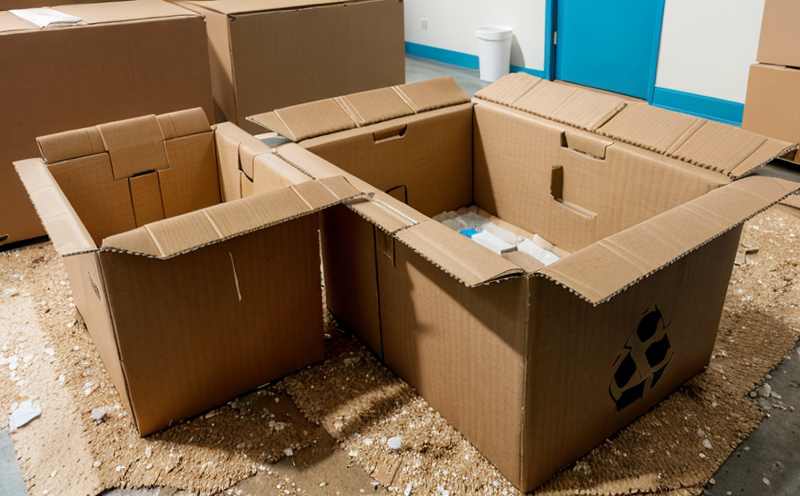TAPPI T425 Opacity of Recycled Paper
The measurement of opacity in recycled paper is critical for ensuring that the final product meets customer expectations and industry standards. The TAPPI standard T425 is widely recognized as a reliable method to determine the light-blocking properties of recycled papers, which helps manufacturers ensure consistent quality.
The opacity test measures how well a paper sample blocks light from passing through it. Higher opacity indicates that less light passes through the paper, making it better at hiding the underlying printing or writing on the back side. This is particularly important for products like corrugated cardboard and recycled office papers where appearance and performance are key factors.
The test procedure outlined in TAPPI T425 involves measuring the light transmission of a sample using a spectrophotometer, which provides an accurate measurement of opacity by calculating the percentage of light blocked. Specimens must be carefully prepared to ensure consistent results, typically involving cutting samples into standard sizes and weighing them before testing.
The significance of this test extends beyond mere aesthetic considerations; it also plays a role in recycling processes where minimizing cross-contamination between different grades of paper is essential. By accurately measuring opacity, manufacturers can better control the quality of recycled content and ensure that the final product meets customer specifications.
Opacity testing is crucial for several reasons:
- To maintain consistent appearance across batches
- To reduce defects in the finished product
- To enhance consumer satisfaction by meeting visual expectations
- To comply with industry standards and regulatory requirements
- To improve recycling efficiency by accurately measuring recycled content
Accuracy is paramount when performing opacity tests, as even small variations can lead to significant differences in the final product. Therefore, it's essential to use high-quality instruments and follow standardized procedures rigorously.
The results of TAPPI T425 testing are often used by quality managers, compliance officers, R&D engineers, and procurement teams to make informed decisions about production processes and material specifications. By understanding the nuances of this test, these professionals can better ensure that their products meet both internal and external expectations.
In conclusion, TAPPI T425 Opacity of Recycled Paper is a vital tool in the recycling industry, providing valuable insights into the quality and performance of recycled paper products. Its importance cannot be overstated, as it directly impacts the final appearance and functionality of these materials.
Eurolab Advantages
At Eurolab, we bring decades of experience in waste management and recycling testing to ensure that our clients receive accurate and reliable results. Our state-of-the-art facilities are equipped with the latest technology, allowing us to provide precise measurements according to international standards such as TAPPI.
- Accurate Equipment: We use high-precision spectrophotometers tailored for opacity testing, ensuring consistent and repeatable results.
- Expertise: Our team of experienced technicians and engineers is well-versed in all aspects of recycling paper testing, including sample preparation and data interpretation.
- Compliance: Eurolab adheres to international standards like ISO 28567:2019 and ASTM D3476, ensuring that our tests meet the highest quality benchmarks.
- Rapid Turnaround: We understand the importance of timely results in today's fast-paced business environment. Our efficient processes allow us to deliver quick reports without compromising on accuracy.
- Detailed Reporting: Every test is accompanied by comprehensive documentation, including raw data and detailed analysis, helping our clients make informed decisions.
We pride ourselves on providing not just accurate results but also valuable insights that can help improve recycling processes and product quality. Whether you're a manufacturer looking to enhance your product line or an organization seeking compliance with strict regulations, Eurolab is here to support you every step of the way.
International Acceptance and Recognition
The TAPPI T425 standard for measuring opacity of recycled paper is widely accepted across the globe due to its reliability and accuracy. Many countries have adopted this method as part of their national standards, ensuring consistency in testing practices worldwide.
Australia and New Zealand are among the many regions that recognize TAPPI T425 as an authoritative reference for opacity measurement. Similarly, European Union directives often cite TAPPI standards when addressing waste management and recycling issues. In North America, this test is frequently used by paper manufacturers and recyclers to comply with local regulations.
The international acceptance of TAPPI T425 stems from its ability to provide consistent results across different laboratories and countries. This standardization ensures that recycled paper products meet the same quality criteria regardless of where they are manufactured or tested.
By adhering to such internationally recognized standards, Eurolab helps its clients stay compliant with global regulations while also enhancing their reputation for producing high-quality recycled papers.





